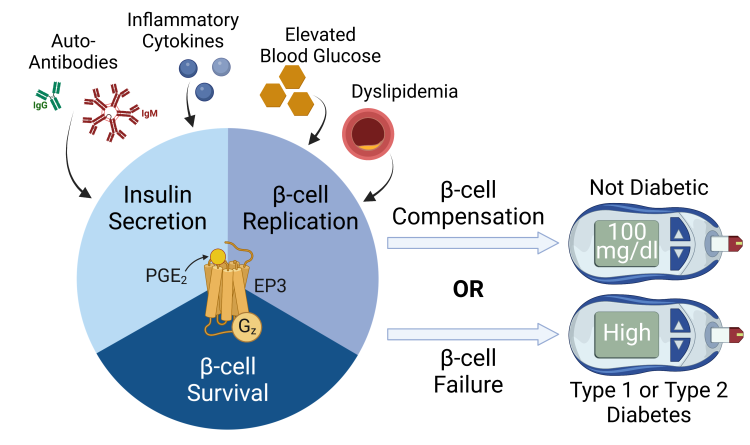Therapeutic Targets for Diabetes
Michelle E. Kimple, PhD, leads a translational research team composed of trainees at all levels. The research focus of the Kimple Lab is understanding how the insulin-producing beta-cells of the pancreas respond to nutrients and hormones to function, multiply, and survive. Understanding the mechanisms behind these processes, and how they are affected in the pathophysiological conditions of type 1 and type 2 diabetes, is a critically important area of research.

Understanding the Pathways of Diabetes Pathogenesis
Dr. Kimple's research team is especially interested in elucidating how dysfunctional G protein-coupled receptor signaling pathways contribute to the pathogenesis of type 1 and type 2 diabetes.
The long-term goal of the Kimple Lab is to translate these insights into new and improved diabetes therapeutics, preventing or even curing these life-long diseases.
Above, research in the Kimple Lab has revealed a critical role of the the Gz-coupled EP3 receptor, which is activated by prostaglandin E2 (PGE2), in blocking the ability of the pancreatic beta-cell to secrete insulin into the bloodstream to control blood sugar levels.
When activated by PGE2, the Gz-coupled receptor also limits the ability of the beta-cell to replicate and survive in the face of the multiple insults its exposed to in the conditions of type 1 and type 2 diabetes.
Research Team

Graduate Student

Research Specialist

Graduate Student

Scientist

Graduate Student

Graduate Student

Administrative Specialist
Students and Collaborators
Undergraduate Students
- Amelia Bader
- Katelyn Glory
- Madelaine Sweeney
- Salina Sang
Volunteer Research Assistant
- Madeline Bonifas
Funding Support
Dr. Kimple's research is funded by the Department of Veterans Affairs and the National Institutes of Health.


